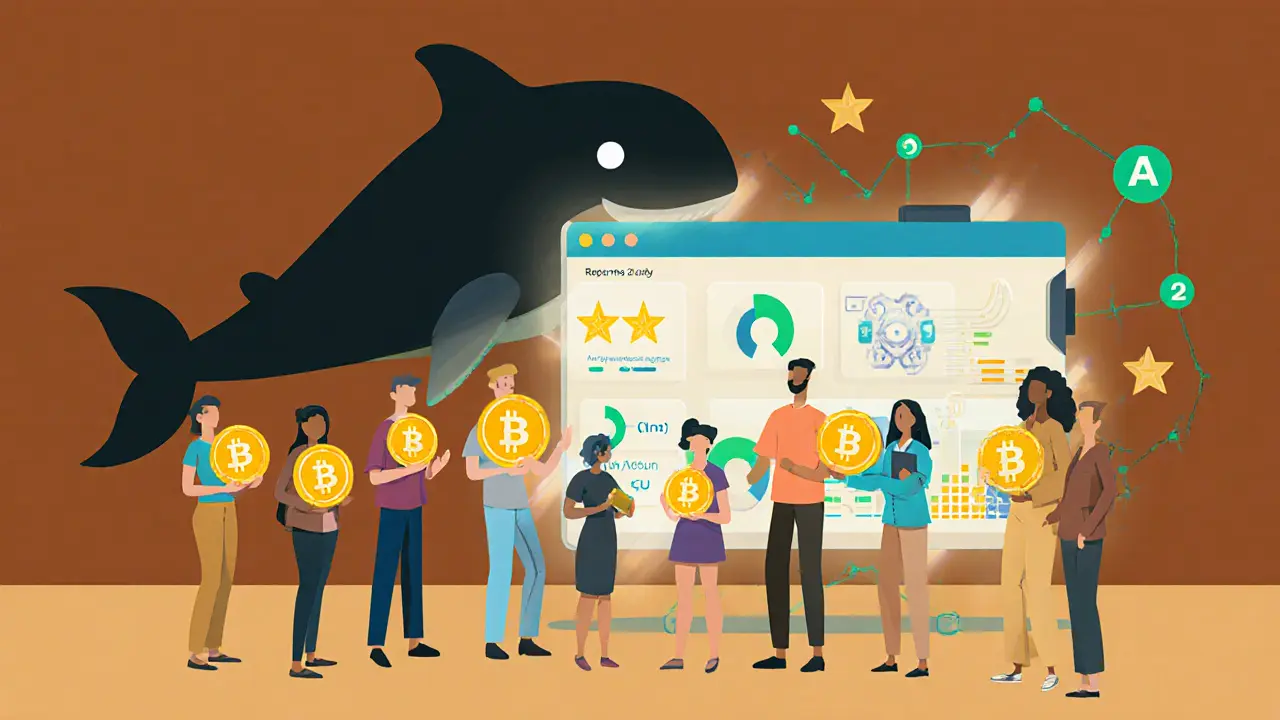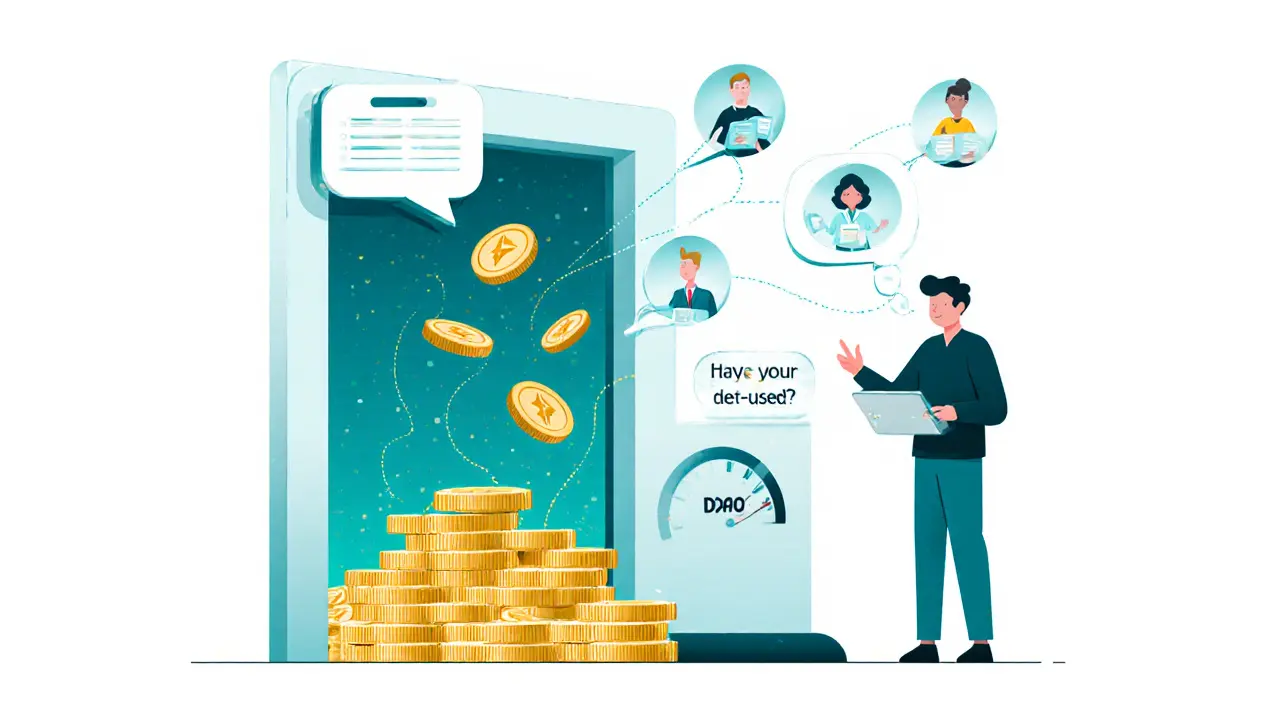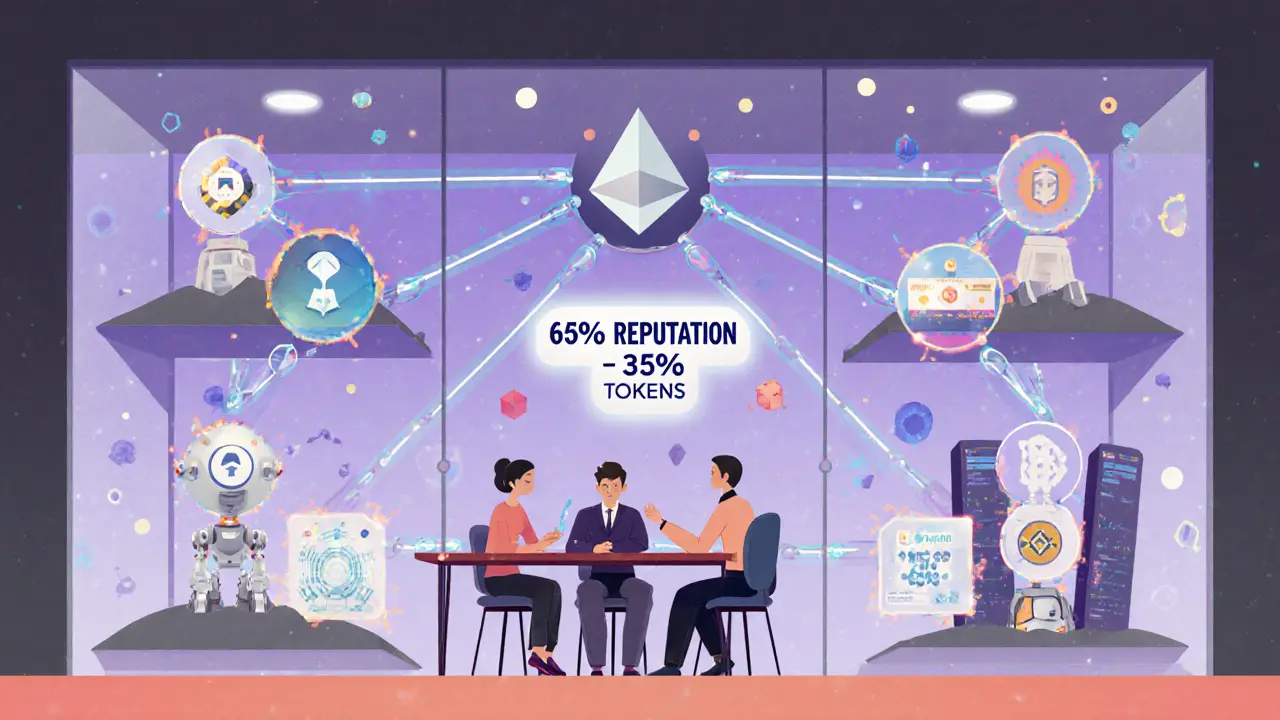Future of DAO Governance Models in 2025: How Decentralized Decision-Making Is Evolving
 Sep, 19 2025
Sep, 19 2025
DAO Voting Power Calculator
Calculate Your Voting Power
Enter your token holdings and reputation points to see how different governance models distribute voting influence. Based on 2025 DAO governance trends.
Your Voting Power Analysis
Enter your values to see how different models distribute influence.
Pro Tip: DAOs with reputation systems see 35%+ participation because voting feels meaningful. Token voting alone leads to 17% average participation as whales dominate.
By 2025, DAO governance is no longer a theoretical experiment. It’s a working system managing over $22.3 billion in assets, with more than 6.5 million people holding governance tokens. But here’s the problem: most people still don’t vote. In fact, the average participation rate across all DAOs is just 17%. That’s not decentralization-that’s apathy. So how are DAOs fixing this? And what does real, sustainable governance look like today?
Token Voting Isn’t Enough Anymore
The original idea was simple: hold more tokens, get more votes. It sounded fair-economic stake equals influence. But reality proved otherwise. In 2024, 73% of contentious votes in major DAOs were swayed by holders controlling over 30% of the tokens. These are the so-called "whales"-a few wallets with enough power to override entire communities.Gitcoin DAO tried a fix: quadratic voting. Instead of buying 100 votes with 100 tokens, you pay 10,000 tokens for your 100th vote. That’s 1², 2², 3²… up to n². Suddenly, small holders could amplify their voice without needing millions in tokens. After switching, Gitcoin saw a 22% drop in whale influence. And users noticed. One participant wrote: "My small contribution actually felt meaningful for the first time."
But quadratic voting isn’t perfect. It’s complex. It requires users to understand math they never learned. That’s why many DAOs are blending it with other models-like reputation.
Reputation Is the New Voting Power
What if your vote didn’t depend on how many tokens you bought, but on what you actually did? That’s the core idea behind reputation-based governance. DAOs like Colony track 27 different contribution metrics: code commits, community moderation, event organizing, translation work, even helping new members on Discord.Reputation doesn’t expire. It grows with your activity. In Colony’s system, reputation accounts for 65% of your voting power. Tokens? Just 35%. This flips the script. A person with 10,000 tokens but zero contributions gets less say than someone with 500 tokens but who’s been fixing bugs and answering questions for two years.
A CoinDesk survey of 1,200 DAO members in February 2025 found that 63% preferred reputation systems over pure token voting. One respondent said: "My expertise in smart contract security should count more than how many tokens I hold." That’s the future: governance based on value created, not value owned.
AI Is Now Part of the Voting Process
You don’t need to be a coder to see this: DAOs are drowning in proposals. MakerDAO members get an average of 17 proposals per week. No human can read all of them. So DAOs turned to AI.By 2025, 43% of DAOs use AI tools to summarize proposals, flag risky spending, or even suggest amendments. Snapshot’s AI-powered summarization tool cut proposal review time by 47%. Instead of spending an hour parsing legal jargon, you get a one-paragraph summary: "This proposal wants to spend $500K on marketing. Risk: low. Impact: high. Suggested change: split budget between two campaigns."
Some DAOs go further. AI agents now handle routine treasury decisions-like rebalancing stablecoins or auto-distributing interest. In mature DAOs, 35% of treasury actions are handled by AI, with human voters only stepping in for major shifts. These AI delegates don’t vote. They recommend. And they’re capped. Every AI system has a "circuit breaker"-if it tries to move more than $100K without approval, it freezes until a human reviews it.
This isn’t about replacing people. It’s about freeing them. The best DAOs now use AI for grunt work and humans for strategy.

Quitting Is a Feature, Not a Bug
Not every DAO survives. ConstitutionDAO failed after buying a copy of the U.S. Constitution-then couldn’t decide what to do with it. 78% of participants left because "decision-making was vague."That’s why rage-quit mechanisms are now standard. First pioneered by MolochDAO, rage-quit lets you leave a DAO at any time and take your share of the treasury. No vote. No delay. Just click, and your ETH or tokens are sent to your wallet.
It sounds extreme. But it’s the ultimate check on bad governance. If you don’t like how decisions are made, you don’t have to wait for a vote. You can walk away-with your money. Today, 61% of DAOs have this feature. It’s not about trust. It’s about exit power.
Cross-Chain Governance Is Here
DAOs used to live on one blockchain. Now, they’re everywhere. Over 68% of DAOs operate across at least two chains as of Q1 2025. Why? Because users are on different networks. Some use Ethereum. Others use Arbitrum, Polygon, or Cosmos.Polkadot’s XCMP protocol and zk-powered bridges now let DAOs coordinate votes across chains without a central server. You can vote on a proposal on Arbitrum, and your vote counts in a treasury decision happening on Cosmos. No bridges. No custodians. Just smart contracts talking to each other.
This isn’t just technical-it’s cultural. DAOs that stay on one chain are becoming islands. The ones growing fast are multi-chain by design.

Legal Uncertainty Is the Biggest Roadblock
You can build a perfect DAO. But if the government says it’s illegal, it doesn’t matter.As of January 2025, only 7 jurisdictions have clear legal frameworks for DAOs. Wyoming, Tennessee, and the Marshall Islands lead the way. The EU’s 2025 Digital Governance Act gives provisional recognition to DAOs that meet transparency rules. But in the U.S., the SEC’s February 2025 enforcement action against "unregistered security offerings" scared off 62% of DAOs operating here.
Most DAOs still operate in legal gray zones. Some register as LLCs in Wyoming. Others use offshore foundations. But the truth? Without legal personhood, DAOs can’t sign contracts, open bank accounts, or sue someone who steals their funds. That’s the biggest barrier to enterprise adoption.
Fortune 500 companies are experimenting with DAOs-but only for small, experimental projects. They won’t move core operations until the law catches up.
What Does a Successful DAO Look Like in 2025?
The best DAOs don’t rely on one model. They mix and match. They’re modular.Take a DAO building open-source AI tools:
- They use reputation to weight votes for technical proposals.
- They use quadratic voting for treasury spending.
- They use AI to summarize and filter proposals.
- They’re cross-chain so contributors on any network can join.
- They have a rage-quit option built in.
- They’re legally registered as a Wyoming LLC.
This isn’t theoretical. It’s happening now. DAOs that do this see voter participation rates above 35%-double the average.
The future isn’t fully autonomous. It’s not fully human. It’s a hybrid. A system where algorithms handle the boring stuff, humans handle the hard choices, and the rules are clear enough that even someone with 50 tokens feels like they matter.
What’s Next? The Road to 2030
Analysts predict DAOs will manage over $1 trillion in assets by 2030. But only if they solve three things:- Get voter participation above 35%-not through incentives, but through better design.
- Win legal recognition globally-not just in a few states.
- Break the whale monopoly-not by banning big holders, but by giving everyone else real power.
The tools are here. The data is clear. The question isn’t whether DAOs will evolve. It’s whether the people running them are ready to let go of old ideas and build something truly new.
What is the most common DAO governance model in 2025?
Token-based voting is still the most common, used by 58% of DAOs. But it’s no longer the dominant model in practice. Leading DAOs now use hybrid systems-combining token voting with reputation, quadratic voting, and AI assistance. Pure token voting is fading because it favors whales and discourages small holders.
Why do most people not vote in DAOs?
Three main reasons: time, complexity, and powerlessness. People hold tokens in 10+ DAOs but can’t read 17 proposals per week. Many don’t understand voting mechanisms like quadratic voting. And when they do vote, they often feel ignored-especially if whales override their choices. The result? Voting fatigue. DAOs that fix this use AI summaries, reputation systems, and fewer, higher-quality proposals.
Can AI really make decisions in a DAO?
AI doesn’t vote. It assists. In 2025, AI handles routine tasks like rebalancing stablecoin reserves, flagging suspicious treasury withdrawals, or summarizing long proposals into bullet points. Humans still approve major changes. AI acts like a smart assistant-it reduces noise, highlights risks, and speeds things up. But it can’t override human votes. Every AI system has built-in limits and emergency stop buttons.
What’s the difference between token voting and reputation-based voting?
Token voting gives power based on how many tokens you own. Reputation voting gives power based on what you’ve contributed-like writing code, organizing events, or helping new members. In a reputation system, someone with 1,000 tokens but no history gets less say than someone with 200 tokens who’s been active for two years. Reputation rewards participation, not wealth.
Are DAOs legal in the U.S.?
It’s complicated. Only Wyoming, Tennessee, and the Marshall Islands have clear legal frameworks for DAOs. In most U.S. states, DAOs operate in a gray area. The SEC’s 2025 enforcement actions labeled some governance tokens as unregistered securities, creating fear. Many U.S.-based DAOs now register as LLCs in Wyoming to gain legal standing. Without legal personhood, DAOs can’t sign contracts or sue in court-which limits their ability to grow.
What’s the best tool for starting a DAO in 2025?
For most teams, Snapshot + Aragon is the best combo. Snapshot handles off-chain voting (cheap and fast), while Aragon provides on-chain treasury control and legal structure templates. Together, they support reputation systems, quadratic voting, AI integrations, and multi-chain support. Newer tools like Tally are catching up, but Snapshot has processed over 12 million votes across 15,000+ DAOs-proven at scale.
How do I avoid being ignored in a DAO?
Don’t just vote. Contribute. Join working groups, help with documentation, translate proposals, or answer questions on Discord. Reputation systems reward action, not tokens. Even small, consistent contributions build influence over time. Also, use quadratic voting when available-it lets your voice matter even if you don’t own many tokens. And if you’re still ignored? Use rage-quit. Walk away with your share. That’s the real power move.
Will DAOs replace corporations?
Not completely. But they’re replacing parts of them. DAOs won’t replace your local bank or hospital. But they’re already replacing corporate R&D teams, open-source funding, and creative collectives. Companies like Microsoft and Google are using DAOs for specific projects because they’re faster, more transparent, and attract global talent. The future isn’t DAOs vs. corporations-it’s DAOs as new kinds of organizations that coexist with traditional ones.
DAO governance in 2025 isn’t about perfect systems. It’s about adaptable ones. The winners aren’t the most decentralized. They’re the ones that listen, adapt, and make it easy for ordinary people to participate. The technology is ready. Now, it’s up to the communities to build something that lasts.
Kris Young
November 21, 2025 AT 11:53Token voting is broken. Simple. It’s not about fairness-it’s about power. And power always concentrates. Quadratic voting? Yes. Reputation? Absolutely. AI summaries? Needed. But none of it matters if people feel like their vote is just noise.
I’ve been in five DAOs. Only one made me feel like I mattered. Why? Because they tracked my contributions-fixing docs, answering questions, translating. Not my wallet balance.
People don’t vote because they’re lazy. They vote because they’re ignored. Fix the system, not the turnout.
Also-rage-quit isn’t extreme. It’s justice.
taliyah trice
November 23, 2025 AT 01:52My grandma joined a DAO last month. She doesn’t know what a smart contract is. But she helped translate proposals into Spanish. Now she has voting power. And she votes every week.
That’s the future. Not tech. Not tokens. People.
Charan Kumar
November 24, 2025 AT 01:26Peter Mendola
November 25, 2025 AT 18:45Terry Watson
November 27, 2025 AT 12:34Can we just pause for a second and appreciate how wild this is? We’re building governance systems that don’t rely on CEOs, boards, or lawyers… and it’s working?
Reputation-based voting? Quadratic? AI summarizers? Rage-quit? This isn’t Web3-it’s the future of democracy.
Imagine if your city council operated like this. You’d actually show up. You’d feel heard. You wouldn’t need to protest in the streets-you’d just vote, contribute, and walk away if it went off the rails.
I’m not being dramatic. This is the most important social innovation since the printing press. And we’re talking about it like it’s a crypto meme.
Someone’s gonna write a book about this in 2030. And we’ll all say, ‘I was there.’
Sunita Garasiya
November 29, 2025 AT 02:44Oh wow, so now we’re using AI to decide if your $500K marketing proposal is ‘low risk, high impact’? Next thing you know, the algorithm will tell you what to eat for breakfast too.
Reputation systems sound nice until you realize the same 3 people who answer every Discord question are also the ones who get to vote on everything. It’s just meritocracy with a fancy name.
And rage-quit? Cute. But what if you’re stuck with a DAO that’s 90% scam tokens and 10% actual work? You ‘rage-quit’… and lose 80% of your money because the treasury is illiquid.
It’s not governance. It’s a game of musical chairs with crypto.
Mike Stadelmayer
November 29, 2025 AT 21:12Love the hybrid models. Real talk-most people don’t care about DAOs. They care about whether they can get paid, learn something, or work with cool people.
The ones who stick around? They’re not there for the tokens. They’re there because someone asked them to help with a translation, or they got thanked for fixing a bug.
That’s the magic. Not the math. Not the AI. Just… being seen.
Keep it human.
Norm Waldon
November 30, 2025 AT 16:55This is all a distraction. The SEC is coming. They’ve already labeled governance tokens as securities. This whole ‘DAO’ thing is just a shell game to avoid taxes and regulations.
Wyoming LLCs? Please. That’s a legal loophole, not a revolution. The moment a DAO tries to hire a developer or sign a real contract, the system collapses.
And AI? Don’t be naive. AI is controlled by the same people who run the banks. They’re not helping you-they’re automating control.
This isn’t decentralization. It’s surveillance capitalism with a blockchain sticker on it.
neil stevenson
December 2, 2025 AT 15:30